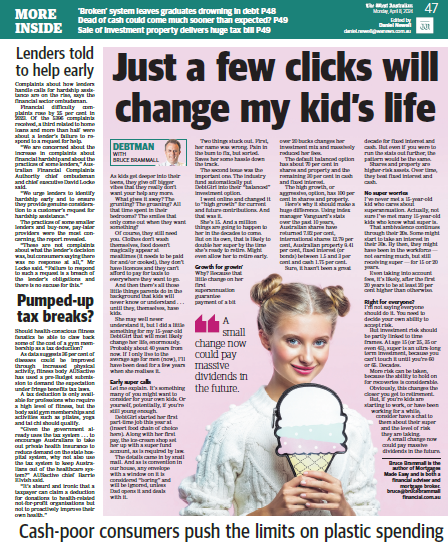
Bruce Brammall, The West Australian, 8 April 2024
As kids get deeper into their teens, they give off bigger vibes that they really don’t want your help no more.
What gives it away? The grunting? The groaning? All that time spent in their bedrooms? The smiles that only come out when they want something?
Of course, they still need you. Clothes don’t wash themselves, food doesn’t magically appear at mealtimes (it needs to be paid for and/or cooked), they don’t have licences and they can’t afford to pay for taxis to everywhere they want to go.
And then there’s all those little things parents do in the background that kids will never know or understand … until they, themselves, have kids.
She may well never understand it, but I did a little something for my 15-year-old DebtGirl that that will most likely change her life, enormously.
Probably about 40 years from now.
If I only live to the average age for men (now), I’ll have been dead for a few years when she realises it.
Early super calls
Let me explain. It’s something many of you might want to consider for your own kids. Or yourself, potentially, if you’re still young enough.
DebtGirl started her first part-time job this year at (insert food chain of choice here). Along with her first pay, the ice-cream shop set her up with a super fund account, as is required by law.
The details came in by snail mail. And as is convention in our house, any envelope with a window on it is considered “boring” and will be ignored, unless Dad opens it and deals with it.
Two things stuck out. First, her name was wrong. Pain in the bum to fix, but sorted. Saves her some hassle down the track.
The second issue was the important one. The industry fund automatically put DebtGirl into their “balanced” investment option.
I went online and changed it to “high growth” for current and future contributions. And that was it.
She’s 15. And a million things are going to happen to her in the decades to come. But on its own, that is likely to double her super by the time she’s ready to retire. Might even allow her to retire early.
Growth for growing
Why? Because that little change on her first Superannuation Guarantee payment of a bit over twenty bucks changes her investment mix and massively reduced her fees.
The default balanced option has about 70 per cent in shares and property and the remaining 30 per cent in cash and fixed interest.
The high growth, or aggressive, option, has 100 per cent in shares and property.
Here’s why it should make a huge difference. Using index manager Vanguard’s stats over the last 10 years, Australian shares have returned 7.82 per cent, international shares 12.79 per cent, Australian property 9.41 per cent, fixed interest (or bonds) between 1.5 and 3 per cent and cash 1.75 per cent.
Sure, it hasn’t been a great decade for fixed interest and cash. But even if you were to run the stats out further, the pattern would be the same.
Shares and property are higher-risk assets. Over time, they beat fixed interest and cash.
No super worries
I’ve never met a 15-year-old kid who cares about superannuation. Actually, not sure I’ve met many 15-year-old kids who know what super is.
That ambivalence continues through their 20s. Some might start to take an interest in their 30s.
By then, they might have been in the workforce – not earning much, but still receiving super – for 15 or 20 years.
Even taking into account fees, it’s likely, after the first 20 years to be at least 20 per cent higher than otherwise.
Right for everyone?
I’m not saying everyone should do it. You need to decide your own ability to accept risk.
But investment risk should be partly linked to time frames. At age 15 (or 25, 35 or even 45), superannuation is an ultra-long term investment, because you can’t touch it until you’re 60 or 65. Decades.
More risk can be taken, because the ability to hold on for recoveries is considerable.
Obviously, this changes the closer you get to retirement.
But, if you’re kids are starting to work, or have even been working for a while, consider having a chat to them about their super and the level of risk they are taking.
A small change now could pay massive dividends in the future.
Bruce Brammall is the author of Mortgages Made Easy and is both a financial adviser and mortgage broker. E: bruce@brucebrammallfinancial.com.au.
Very insightful and thought provoking.